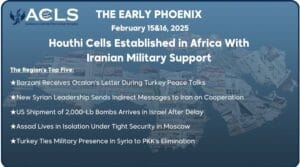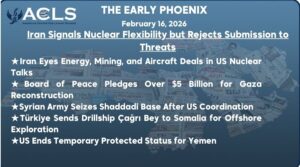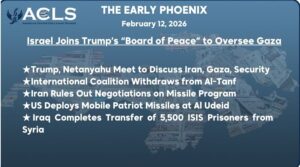★ Yemen
-
Houthi Cells Established in Africa With Iranian Military Support
A captured Eritrean national revealed Houthi efforts to form cells in Africa’s Red Sea region, backed by Iranian military and financial support. The detainee, Ali Ahmed Yaidi, disclosed plans to recruit members of the Afar tribe across Djibouti, Eritrea, and Ethiopia. Houthis train recruits in Yemen, aiming to spread their ideology and create Hezbollah-style militant groups. The revelations highlight Iran’s expanding influence and efforts to destabilize the region through armed proxies and sectarian indoctrination.
-
EU Extends Red Sea Naval Operations Against Houthi Threats Until 2026
The European Union extended its naval mission protecting commercial shipping and navigation in the Red Sea and Gulf of Aden for another year. The EU Council announced the EUNAVFOR ASPIDES operation will continue until February 28, 2026, following a strategic review. The extension includes a budget exceeding €17 million and enhanced intelligence-gathering capabilities. The decision reflects ongoing security concerns and efforts to counter Houthi threats, ensuring maritime stability in the strategically vital region.
-
Yemeni Coast Guard Seizes Iranian Weapons Shipment With Suicide Drones
U.S. Central Command confirmed Yemen’s Coast Guard intercepted an Iranian arms shipment destined for Houthi militants. The seized cargo included advanced weapon components, drones, and communication equipment. The interception underscores Iran’s ongoing military support for Houthis, violating international sanctions. U.S. officials praised Yemen’s government for securing regional waters and preventing further escalation.
-
Yemen Signs Debt Restructuring Agreement With Arab Monetary Fund
Yemen’s government signed an agreement with the Arab Monetary Fund to restructure its debt, including loan repayments and installments. The deal aims to improve financial stability, support development projects, and advance economic reforms. Yemeni Finance Minister Salem Bin Breik signed the agreement with Fund Chairman Fahd Al-Turki, alongside Saudi Finance Minister Mohammed Al-Jadaan. The signing occurred during the Emerging Markets Economies Conference in AlUla, Saudi Arabia, reflecting regional efforts to stabilize Yemen’s struggling economy.
===============
★ SYRIA
-
Russia Adjusts Military and Economic Strategy in Syria During Shifting Priorities
Russia is reassessing its military presence in Syria while maintaining economic support, as Britain tracked six Russian warships withdrawing ammunition following Assad’s ouster. The UK confirmed these withdrawals, which indicated Moscow’s shifting focus to Ukraine. Meanwhile, President Vladimir Putin discussed regional stability and revising agreements with Syria’s new leader. In parallel, Syria’s central bank confirmed receiving an undisclosed amount of Syrian lira from Russia, reinforcing economic cooperation and financial stability during Syria’s ongoing reconstruction efforts.
-
Israel Expands Military Presence in Syria’s Quneitra
Israeli forces continue incursions into Quneitra, establishing military bases and surveillance posts while conducting population surveys in Al-Rafid. Over the past two months, Israel reinforced its presence, creating permanent bases linked to Golan Heights routes. Following Assad’s fall in December, Israeli troops secured over ten positions in Syria’s buffer zone. While Netanyahu claims the deployment is temporary, Syrians fear it signals a permanent occupation, raising concerns over long-term Israeli territorial ambitions in the region.
-
U.S. Airstrike Kills Senior Al-Qaeda-Affiliated Leader in Syria
The U.S. military confirmed a February 15 airstrike killed a senior Hurras al-Din logistics and finance official, disrupting extremist operations. Hurras al-Din, designated a terrorist group in 2019, dissolved after Assad’s fall. Washington intensified airstrikes post-Assad, targeting 75 ISIS sites since December while maintaining 2,000 troops in Syria for counterterrorism.
-
Syria Captures Key ISIS Leader Abu al-Harith al-Iraqi
Syrian authorities arrested Abu al-Harith al-Iraqi, a senior ISIS leader responsible for planning major attacks. He oversaw recruitment, logistics, and assassinations, including Maysar al-Jubouri’s killing. He also directed the foiled attack on Sayyida Zainab’s shrine near Damascus. His capture deals a major blow to ISIS, disrupting its operational networks and preventing future attacks in Syria and Iraq.
-
Assad Lives in Isolation Under Tight Security in Moscow
Since his ouster in December, Bashar al-Assad has resided in a luxury Moscow skyscraper under strict Russian security. He transported vast wealth before his fall, with his family acquiring 19 high-end apartments. Assad remains reclusive, possibly due to Asma’s worsening leukemia, depression, or security concerns. Russian media avoids covering his presence to maintain ties with Syria’s new government. Despite asylum, Assad’s movements are heavily restricted, with Russian intelligence ensuring his protection during ongoing security threats.
-
Syria Calls for Sanctions Lift as Turkey Engages U.S. on Stability
Syrian Foreign Minister Asaad Al-Shibani urged lifting sanctions, emphasizing inclusive governance, and integrating armed groups into the national army. He highlighted Syria’s post-Assad struggles and sought stronger U.S. ties. Turkish Foreign Minister Hakan Fidan revealed Ankara’s talks with Trump’s administration, addressing regional demands and supporting Syria’s stability. Fidan reaffirmed Turkey’s commitment to Syria’s unity, economic recovery, and reconstruction, viewing this as a crucial opportunity to resolve Syria’s decade-long crisis.
-
Syrian Opposition Conference in Geneva Proposes Transitional Reforms
A Geneva conference led by Haitham Manna gathered 1,000 opposition figures, discussing governance, human rights, and economic recovery. Attendees proposed a temporary constitution, a national army free from political influence, and independent committees to monitor political and humanitarian issues. The meeting was viewed as the first external opposition government. Meanwhile, Syrian President Al-Julani visited Tartous and Latakia, attempting to project control despite being unable to access over half of Syria’s provinces.
============
★ ISRAEL-HAMAS WAR
-
Hamas and Israel Exchange Hostages and Prisoners as Part of Ceasefire Agreement
As part of the ongoing ceasefire agreement, Hamas released three Israeli hostages —Yair Horn, Sagui Dekel-Chen, and Sasha Troufanov—to the Red Cross in Khan Younis. In return, Israel released 369 Palestinian prisoners, including 36 serving life sentences for terror attacks, such as Ahmed Barghouti and Shadi Abu Shakhdam. This exchange marks the first phase of the deal, with further negotiations for additional exchanges expected next week. Currently, 73 Israeli hostages remain in Gaza, with half estimated to be alive.
-
US Shipment of 2,000-Lb Bombs Arrives in Israel After Delay
A shipment of 1,800 U.S. bombs, including MK-84 2,000-pound munitions, arrived in Israel after being delayed by the Biden administration. The bombs were unloaded at Ashdod Port and delivered to Israeli airbases. Defense Minister Israel Katz emphasized the importance of this shipment for strengthening the Air Force and Israel’s defense. Since October 2023, over 76,000 tons of military equipment have been delivered to Israel as part of ongoing U.S. support during the Gaza conflict.
-
Israeli Forces Clash with Resistance, Raid Ofer Prison, and Exacerbate Humanitarian Crisis
Israeli forces raided Nablus, injuring Palestinians, including children, during clashes with resistance fighters, with 14 reported injuries. In Jenin, the ongoing assault led to 25 deaths, displaced over 20,000, and destroyed vital infrastructure. The occupation also blocked water supplies to hospitals. Simultaneously, Israeli forces raided Ofer Prison, assaulting detainees with beatings and gas, prompting condemnation from Hamas and rights groups. The raid violated prisoners’ rights and remains a point of focus in prisoner exchange negotiations under the ceasefire agreement.
-
IDF Drone Strikes in Gaza and Weapon Smuggling Interception
The IDF carried out two drone strikes in Gaza, killing three Hamas police officers in Rafah, which Hamas condemned as a ceasefire violation. The IDF also thwarted a weapon smuggling attempt from Egypt, shooting down a drone carrying ammunition and rifles. This follows multiple similar interceptions, emphasizing Israel’s efforts to prevent illegal arms trafficking across the Sinai border. The IDF continues to warn Gazans against approaching military positions while negotiations with Hamas aim to sustain the fragile ceasefire.
============
★ IRAN
-
Trump Seeks Secret Nuclear Negotiations With Iran Before October Deadline
A senior European official revealed the U.S. is pursuing secret direct negotiations with Iran over its nuclear program. The Trump administration aims to secure an agreement before October when the 2015 nuclear deal expires. Trump withdrew from the agreement in 2018, increasing tensions. Recent U.S.-Iran exchanges have signaled a softer tone, suggesting potential diplomatic progress. The administration is prioritizing negotiations to prevent escalation and establish new terms before the current deal reaches its expiration.
-
U.S.-Israel Agreement to Block Iran From Nuclear Weapons Development
U.S. Secretary of State Marco Rubio and Israeli Prime Minister Benjamin Netanyahu reaffirmed efforts to prevent Iran from acquiring nuclear weapons. Rubio stated Iran cannot become a nuclear power, warning it would resist sanctions and pressure. He called Iran the biggest destabilizing force in the Middle East. Netanyahu emphasized collaboration with Washington to counter Iran’s nuclear ambitions and militant support. He highlighted significant strikes against Iran during the Gaza conflict, expressing confidence in achieving their objective.
-
New Syrian Leadership Sends Indirect Messages to Iran on Cooperation
Iranian envoy Mohammad Reza Raouf Shibani confirmed indirect communication between Tehran and Syria’s new leadership. He acknowledged receiving positive messages from Syrian officials, aligning with recent statements by Syrian Foreign Minister Asaad Al-Shibani. The exchanges indicate potential diplomatic shifts, signaling evolving ties between both governments. Iranian state media emphasized these interactions as a foundation for future cooperation. The timing of any formal decision remains uncertain, suggesting cautious strategic calculations by both nations in navigating regional dynamics.
-
Iran’s Non-Oil Exports to Neighboring Countries Rise by 28%
Iran exported 75.38 million tons of non-oil goods worth $29.78 billion to 15 neighboring countries in ten months. This marks a 24% increase in weight and 28% rise in value compared to last year. Non-oil exports represented 59.2% of Iran’s total export weight and 62.4% of its total export value. Total trade with neighbors reached $59.7 billion, reflecting a 19.2% value increase. Iran exchanged 93.57 million tons of goods, reinforcing regional economic ties.
===============
★ TURKIYE
-
Ankara and Paris Discuss Syria and Turkey-EU Relations
Turkish Foreign Minister Hakan Fidan met French counterpart Jean-Noël Barrot at the Munich Security Conference to discuss Syria’s stability and Turkey-EU relations. Fidan emphasized joint efforts for security, reaffirming Turkey’s commitment to combating PKK and ISIS. He stressed that Turkey-EU relations should focus on mutual interests, not identity debates. The ministers also addressed diplomatic efforts to resolve the Russia-Ukraine war, highlighting regional security, economic partnerships, and strategic cooperation between Ankara and Paris.
-
Turkey Ties Military Presence in Syria to PKK’s Elimination
Turkish Foreign Minister Hakan Fidan stated that Turkey will reconsider its military presence in Syria if the new leadership dismantles the PKK. Speaking at the Munich Security Conference with Syrian Foreign Minister Asaad Al-Shibani, Fidan reiterated Ankara’s stance against Kurdish armed groups. He emphasized integrating all militias into a unified Syrian national army. Turkey classifies the PKK as a terrorist organization and demands its eradication as a condition for withdrawing its forces from Syria.
-
Turkey, Jordan, Iraq, and Syria Form Anti-ISIS Coalition
Turkey, Jordan, Iraq, and Syria established a joint mechanism to combat ISIS and counter U.S. support for Kurdish forces. Their foreign, defense, and intelligence officials will meet in Amman to coordinate security efforts. Turkey seeks broader regional cooperation with Iran, Iraq, and Syria against the PKK. The alliance challenges U.S. claims that Kurdish-led forces are essential for ISIS containment, pressuring Washington’s Syria policy under Trump’s administration.
-
Türkiye’s Exports to Slovenia Reach Record $371.5 Million in January
Türkiye’s exports to Slovenia surged 119.3% annually, reaching $371.5 million, driven by strengthened trade relations. The automotive sector led with $170.9 million, followed by chemicals at $170.3 million. Other growing industries included steel, electronics, and textiles. Kocaeli province accounted for 80% of total exports. The 2011 Strategic Partnership Document facilitated economic cooperation, boosting Türkiye’s presence in Slovenian markets and enhancing bilateral trade within the European Union.
===============
★ LEBANON
-
UN Commander Injured in Hezbollah-Backed Attack Near Beirut Airport
Hezbollah supporters attacked a UNIFIL convoy near Beirut airport, injuring Deputy Commander Gen. Arnaldo Lazaro and damaging vehicles. The UN condemned the assault, calling it a violation of international law, and demanded a Lebanese investigation. The Lebanese Army intervened to restore order, urging citizens to avoid escalating tensions. The UN also advised its personnel to avoid the airport area, emphasizing the need for safety and calm during these volatile circumstances.
-
Netanyahu Calls for Hezbollah Disarmament During Regional Tensions
Israeli Prime Minister Netanyahu called for Hezbollah’s full disarmament during a joint press conference with U.S. Secretary of State Marco Rubio. They also discussed preventing Iran’s nuclear development. Meanwhile, Hezbollah’s Naim Qassem demanded Israel withdraw from South Lebanon and criticized Lebanon’s ban on Iranian planes. Protests followed, resulting in clashes and 23 soldier injuries. Israel’s refusal to vacate five strategic areas by February 18 and Lebanon’s rejection of Israel’s extended presence intensified regional tensions, questioning Lebanon’s security enforcement capabilities.
-
Israel Intensifies Strikes on Hezbollah During Ceasefire Tensions
The Israeli Air Force killed Hezbollah drone commander Abbas Ahmad Hamoud in Southern Lebanon after repeated UAV attacks on Israel. Defense Minister Israel Katz condemned Hezbollah’s actions, vowing retaliation. The IDF targeted Hezbollah sites in the Beqaa Valley, striking rocket launchers and weapons depots. Lebanese media reported Israeli strikes in Harbata and Halbata, with one civilian reportedly killed in Houla. Israel plans a partial withdrawal but will maintain strategic positions, raising Hezbollah’s objections and concerns over Lebanon’s ability to enforce security.
===============
★IRAQ
-
Barzani Receives Ocalan’s Letter During Turkey Peace Talks
A Turkish delegation delivered PKK founder Abdullah Ocalan’s letter to Masoud Barzani, aiming to revive peace talks with Ankara. The meeting near Erbil lasted 105 minutes, with Barzani urging peaceful solutions. Ocalan reaffirmed commitment to reconciliation, while Turkish leader Devlet Bahceli proposed his release if the PKK disbands. A historic announcement from Ocalan is expected before Nowruz in March, raising hopes for a peaceful resolution to the Kurdish conflict.
-
Iraq Bans Five Banks from Dollar Transactions After U.S. Meetings
Iraq’s central bank banned five banks from U.S. dollar transactions following meetings with U.S. Treasury and Federal Reserve officials in Dubai. The move targets money laundering, dollar smuggling, and financial violations. The affected banks—Al Mashriq Islamic, United Investment, Sanam Islamic, Misk Islamic, and Ameen Iraq—can still operate with other currencies. Western officials praised Iraq’s financial reforms limiting Iran’s market access, though pressure may rise under Trump’s administration.
-
Iraq Seeks to Resume Oil Exports via Turkey After $19 Billion Loss
Iraq plans to restart oil exports through Turkey after a two-year halt, costing $19 billion in lost revenue. Foreign Minister Fuad Hussein confirmed talks with Kurdistan’s government to resolve technical issues and determine export volumes. The pipeline previously transported 400,000–500,000 barrels daily but was halted in 2023 over a $1.5 billion arbitration ruling. Iraq’s parliament raised payments to oil firms, increasing hopes for resumption despite OPEC+ production limits and Turkey’s payment dispute.
===============
★ GULF NATIONS
-
Qatar And Jordan Discuss Regional Developments, Reject Gaza Displacement
Qatar’s Prime Minister met Jordan’s Foreign Minister in Doha to discuss Palestine, Syria, and Lebanon, emphasizing regional stability and cooperation. Qatar rejected forced Palestinian displacement from Gaza, warning of escalated violence. Trump proposed seizing Gaza and relocating Palestinians to Egypt and Jordan, with Israel drafting a supporting plan. The proposal faced widespread rejection except in Israel. Talks coincided with a Hamas-Israel ceasefire and prisoner exchange after over a year of Israeli military operations causing massive destruction.
-
UAE and Russia Strengthen Strategic Partnership and Bilateral Ties
UAE President Mohammed bin Zayed met Russian First Deputy Prime Minister Denis Manturov in Abu Dhabi to discuss bilateral relations and strategic cooperation. Talks focused on mutual economic and political interests, emphasizing long-term stability and growth. Both sides exchanged views on key regional and global issues, reaffirming their commitment to collaboration across various sectors. The discussions reflect the strengthening of the UAE-Russia partnership, fostering sustainable development, and enhanced diplomatic engagement for shared national interests.
-
Zelensky Pushes for Prisoner Exchange and Humanitarian Aid in UAE
Ukrainian President Volodymyr Zelensky visited the UAE to secure prisoner releases, strengthen economic partnerships, and launch a humanitarian program. His visit precedes a Trump-Putin summit in Saudi Arabia, where they will discuss ending the Ukraine war. U.S. Vice President J.D. Vance reaffirmed Washington’s commitment to lasting peace, while Zelensky warned Kyiv would reject any agreements made without its involvement. He stressed Ukraine’s urgent need for continued U.S. support to withstand Russia’s invasion.
-
Bin Salman and Macron Discuss Regional Security and Cooperation
Saudi Crown Prince Mohammed bin Salman and French President Emmanuel Macron discussed regional and global developments, emphasizing security, stability, and bilateral cooperation. Talks occurred during threats to the Israeli-Palestinian conflict. two-state solution and increasing U.S. support for Israel. A proposed U.S. plan suggests displacing Gaza residents and taking control. Saudi Arabia reaffirms support for a Palestinian state within 1967 borders. Meanwhile, Gaza faces Israeli attacks, resulting in 160,000 Palestinian casualties, mostly women and children.
============
★ EGYPT
-
U.S. Delegation in Egypt for Talks on Gaza’s Future
Egyptian Foreign Minister Badr Abdel Aty met a U.S. congressional delegation in Cairo to discuss Middle East developments and U.S.-Egypt relations. The delegation included House Foreign Affairs Committee Vice Chair Darrell Issa and Representatives Sheila McCormick, Chuck Edwards, Jim Costa, and James Baird. Discussions focused on Gaza’s future and regional stability during ongoing conflicts. The visit highlights Washington’s diplomatic engagement with Cairo as a key mediator in addressing security and humanitarian challenges in the region.
-
Egypt Plans 58% Increase in Israeli Gas Imports by Mid-2025
Egypt seeks an agreement with Israel to boost natural gas imports by 58% from the current 950 million cubic feet per day. The increase is expected after Chevron expands production at Israel’s Tamar gas field to 1.5 billion cubic feet daily. The deal aims to secure Egypt’s energy needs during peak summer months. Government officials confirmed discussions are ongoing, emphasizing energy security and regional cooperation in the evolving natural gas market.
============




